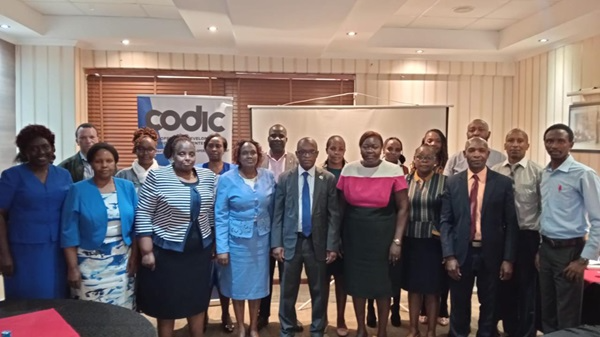
CODIC team drives SACCO digitization in Nairobi, in 2024. The workshop focused on digital transformation strategies for savings cooperatives in Kenya. Photo courtesy:CODIC
In a significant move toward modernizing the cooperative sector, the Nairobi County Government recently partnered with the Cooperative Development Information Centre (CODIC) to host a comprehensive workshop aimed at fostering SACCO digitalization within the county. The event, held at a prestigious Nairobi hotel, brought together key stakeholders to explore ways of enhancing the relationship between CODIC and the Nairobi County Government, aligning with the county’s broader vision of becoming a smart city.
The workshop was graced by the presence of George Mutiso, the Chief Officer for Cooperatives, who served as the Chief Guest. Mutiso highlighted Nairobi County’s pivotal role in the cooperative movement, noting that the county oversees an impressive 60 per cent of SACCO activities nationwide. He emphasized the critical importance of empowering SACCOs through digital solutions, ensuring that the transition to a more technologically advanced future is inclusive and benefits all members.
Elaborating further on the county’s commitment to technological advancements in the cooperative sector, Rahab Chege, the General Manager of CODIC Ltd, shared the inspiring success story of Taqwa SACCO, Kenya’s first Sharia-compliant cooperative society. “Since its inception in 2014 with 3,000 members, Taqwa SACCO has grown to over 14,000 members, providing vital services to the Muslim community. Their commitment to Sharia law has driven growth and inclusivity; through our IT services, we have helped them expand from back office operations to fully integrated services under the Savings and Credit Cooperative Societies Regulatory Authority (SASRA),” Chege noted, urging other Muslim communities to consider faith-based SACCOs.
Daniella Chege, the IT Consultant and Account Executive at CODIC, showcased the innovative Queue Free System (QFS), which allows SACCO members to manage their accounts and access services without the need for physical branches. “QFS strengthens SACCOs by enabling members to check loan balances, make transactions, and transfer funds directly to their bank accounts, enhancing financial management and operational efficiency,” Daniella explained, highlighting the system’s potential to generate new revenue streams for SACCOs through transaction fees.
The workshop underscored Nairobi City County’s unwavering commitment to modernizing the cooperative sector, promoting sustainable growth, and enhancing financial inclusion across communities. Mr. Mutiso reiterated the county’s support for technological advancements in the cooperative sector, recognizing the partnership with CODIC as pivotal to achieving these goals.
In attendance were cooperative development officers led by the County Director, Dolphine Aremo, as well as Esther Mwai, the accounting executive of CODIC, and David Otwoma, the marketing manager of CODIC. The event served as a testament to the synergistic collaboration between Nairobi County and CODIC, paving the way for a more digitally empowered and inclusive SACCO ecosystem that aligns with the county’s smart city aspirations.